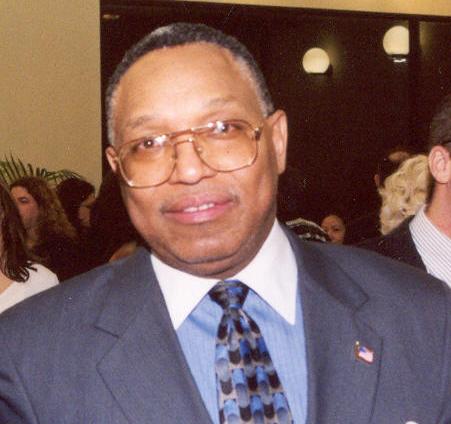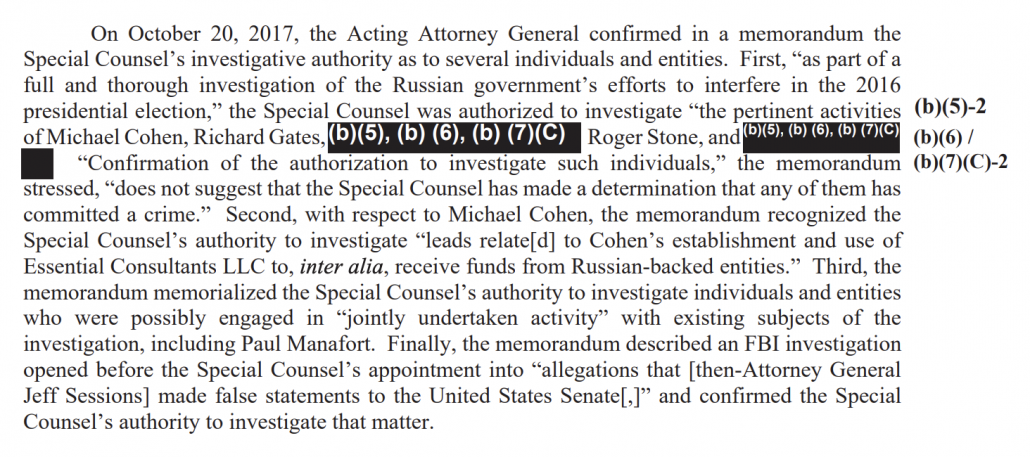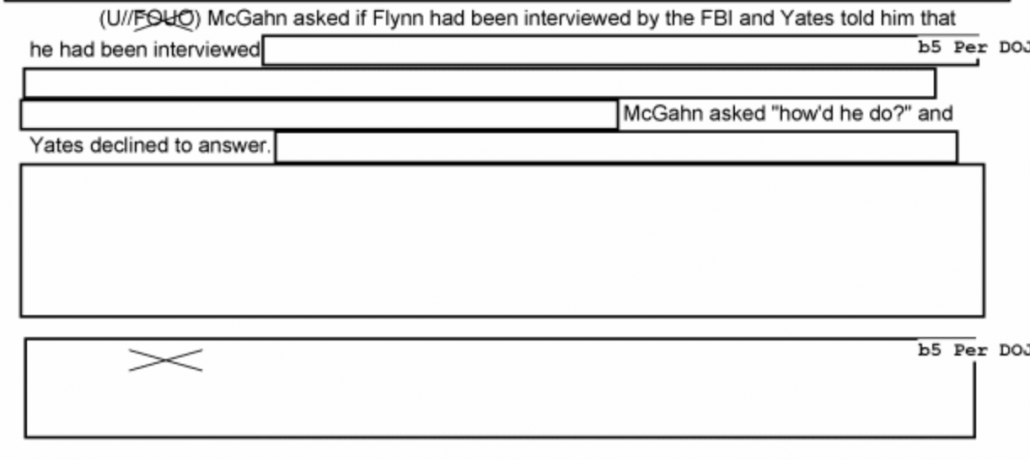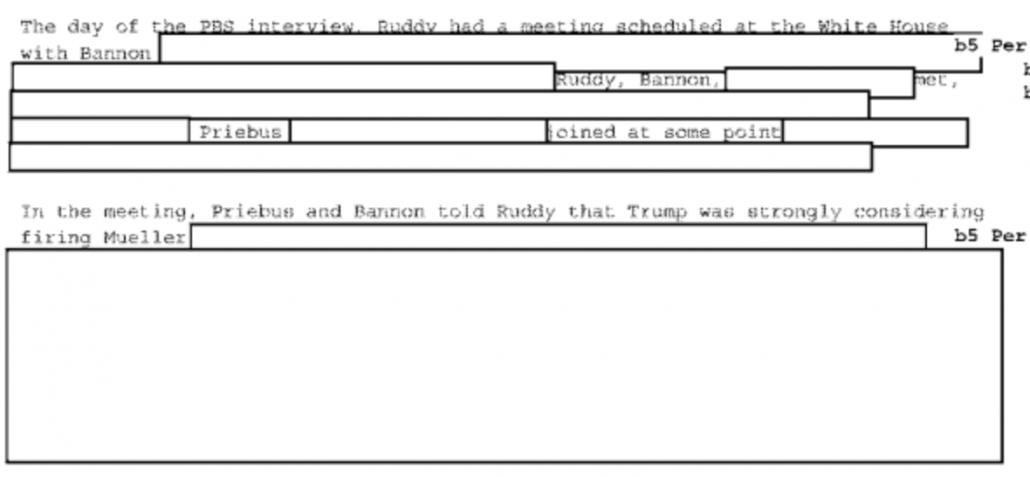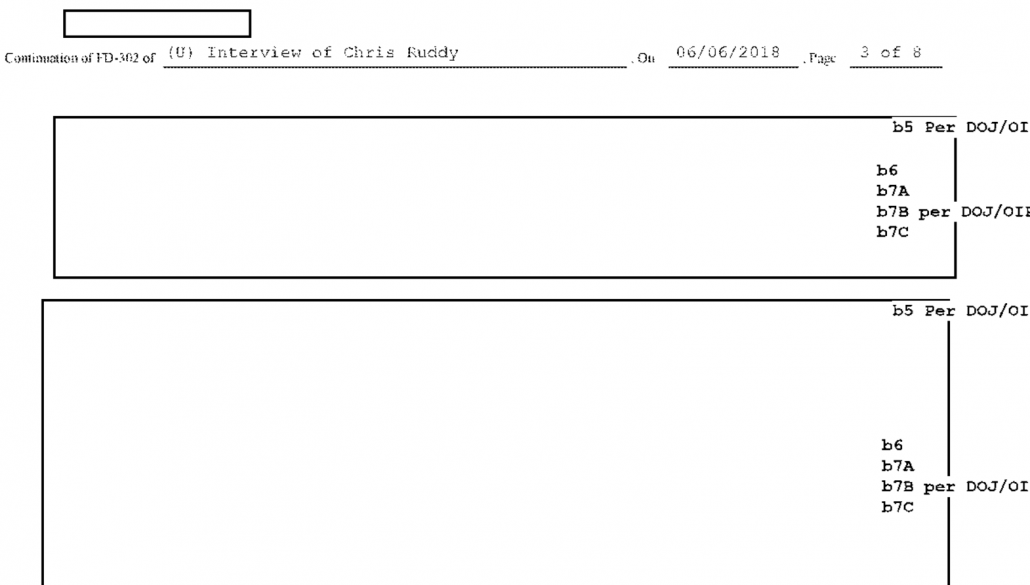In the last several days, part time Director of National Intelligence and full time Twitter troll Ric Grennell declassified the names of people who unmasked Mike Flynn’s name in call transcripts with Sergey Kislyak. The public record already shows the FBI did so after they discovered his calls explained why Russia had not responded as expected after Barack Obama imposed sanctions on Russia on December 28, 2016.
The press has, predictably, chased this issue as a matter of partisan game, demonstrating utter disinterest in how obviously they are being chumps in a political ploy.
Release of the list, which would be an unprecedented move, is likely to resurrect a partisan debate over an episode that had roiled the early days of Mr. Trump’s presidency and has taken on renewed urgency after the Justice Department moved to drop a criminal case against Mr. Flynn last week.
It takes enormous leaps of willful ignorance of the facts to treat this as the partisan spat that Trump wants it to be.
That’s true, for two reasons:
- The public record shows that the Obama Administration did need to know Flynn’s identity to understand the Kislyak intercept and accorded Flynn deference as a result until such time that it appeared Flynn had acted without official sanction
- The public record, over three years after the call, remains consistent with Mike Flynn making that call to Sergey Kislyak without permission from Trump himself, meaning the public record is consistent with Flynn acting on his own
Under FISA, the Executive Branch may not disseminate an American’s identity obtained from a FISA intercept, “unless such person’s identity is necessary to understand foreign intelligence information or assess its importance.” But if the Executive Branch needs that person’s identity to understand foreign intelligence, they can unmask the identity.
It matters that this call was made by the incoming National Security Advisor. At first, Flynn’s identity made the call look less suspicious. But within days of its discovery, Flynn’s own actions had created reason for far greater concern that the incoming NSA had made this call.
At first, the Flynn unmasking led to deference to him, albeit with concerns about sharing intelligence with (just) him
When Russia did not respond to the December 2016 sanctions, per Jim Comey’s testimony, the Intelligence Community tasked its members to learn why not.
And so the last couple days of December and the first couple days of January, all the Intelligence Community was trying to figure out, so what is going on here? Why is this — why have the Russians reacted the way they did, which confused us? And so we were all tasked to find out, do you have anything [redacted] that might reflect on this? That turned up these calls at the end of December, beginning of January.
Some days later, the FBI provided an answer: because someone had called up Russia and asked them not to escalate, and days later Russia had called up and told the same person that Vladimir Putin had not responded because of his call. Imagine the possible implications of this call without the identity. The call could reflect an amazingly powerful private individual who for some reason had the ability to make Vladimir Putin to take action against his stated interests. Or it could reflect something fairly routine. You had to know who made the call to figure out which it was.
In his testimony, Comey made it clear that, 1) they did unmask Flynn’s name but 2) the FBI issued no finalized report on this, meaning they were protecting the discovery from wider dissemination.
We did not disseminate this [redacted] in any finished intelligence, although our people judged was appropriate, for reasons that I hope are obvious, to have Mr. Flynn’s name unmasked. We kept this very close hold, and it was shared just as I described.
Sally Yates’ 302 describes how Obama responded. He stated specifically that he wanted no more follow-up information, but he did want advice on whether his White House should treat Flynn differently as a result.
After the briefing, Obama dismissed the group but asked Yates and Comey to stay behind. Obama started by saying he had “learned of the information about Flynn” and his conversation with Kislyak about sanctions. Obama specified he did not want any additional information on the matter, but was seeking information on whether the White House should be treating Flynn any differently, given the information.
[snip]
Yates recalled Comey mentioning the Logan Act, but can’t recall if he specified there was an “investigation.” Comey did not talk about prosecution in the meeting. It was not clear to Yates from where the President first received the information. Yates did not recall Comey’s response to the President’s question about how to treat Flynn.
A letter Congress sent to Susan Rice quoting from her own letter to the file makes it clear that Obama explicitly stated he wanted no involvement in any law enforcement matters. He just wanted to know whether the Administration should limit how they would share classified information with Flynn during the transition.
On January 5, following a briefing by IC leadership on Russian hacking during the 2016 Presidential election, President Obama had a brief follow-on conversation with FBI Director Jim Corney and Deputy Attorney General Sally Yates in the Oval Office. Vice President Biden and I were also present.
President Obama began the conversation by stressing his continued commitment to ensuring that every aspect of this issue is handled by the Intelligence and law enforcement communities “by the book”. The President stressed that he is not asking about, initiating or instructing anything from a law enforcement perspective. He reiterated that our law enforcement team needs to proceed as it normally would by the book.
From a national security perspective, however, President Obama said he wants to be sure that, as we engage with the incoming team, we are mindful to ascertain if there is any reason that we cannot share information fully as it relates to Russia.
[redacted]
The President asked Comey to inform him if anything changes in the next few weeks that should affect how we share classified information with the incoming team. Comey said he would.
As to DOJ, at first Mary McCord treated this just as Republicans would want: by assuming this was just the normal pre-inauguration outreach one would expect from an incoming National Security Advisor.
It seemed logical to her that there may be some communications between an incoming administration and their foreign partners.
There are several takeaways from this record. We don’t know exactly what the transcripts say (and neither did some of the people involved), but this reaction is entirely inconsistent with Flynn saying anything to Kislyak to indicate he was operating on Trump’s orders. If he had, then Obama would not have had a concern about sharing information with Flynn and only Flynn. If it was clear Trump was involved, Obama’s concerns would be mitigated because Trump constitutionally would be entitled to this anyway. There’s no evidence Flynn made it clear he had Trump’s sanction to make these calls.
These actions also make it clear that, while the FBI responded to this as they would any counterintelligence investigation, both Obama and Rice were very careful about respecting the transition of power. The redacted passage in Rice’s letter is consistent with Obama adopting some caution, but deferring any more drastic measures unless, “anything changes in the next few weeks.”
From January 15, 2017 to the present, the public record has always been consistent with Flynn deciding to make the call on his own — and possibly acting rogue
Ten days after the Obama Administration adopted a cautious response to learning of Flynn’s calls, something did change.
The Vice President went on Face the Nation and told a journalist that he had asked Mike Flynn and Flynn denied speaking about sanctions at all.
MIKE PENCE: I talked to General Flynn about that conversation and actually was initiated on Christmas Day he had sent a text to the Russian ambassador to express not only Christmas wishes but sympathy for the loss of life in the airplane crash that took place. It was strictly coincidental that they had a conversation. They did not discuss anything having to do with the United States’ decision to expel diplomats or impose censure against Russia.
JOHN DICKERSON: So did they ever have a conversation about sanctions ever on those days or any other day?
MIKE PENCE: They did not have a discussion contemporaneous with U.S. actions on–
JOHN DICKERSON: But what about after–
MIKE PENCE: –my conversation with General Flynn. Well, look. General Flynn has been in touch with diplomatic leaders, security leaders in some 30 countries. That’s exactly what the incoming national security advisor–
JOHN DICKERSON: Absolutely.
MIKE PENCE: –should do. But what I can confirm, having spoken to him about it, is that those conversations that happened to occur around the time that the United States took action to expel diplomats had nothing whatsoever to do with those sanctions.
From that moment to this day, the record is consistent with Mike Flynn working without the knowledge of or prior sanction from Trump and Pence. I believe Flynn did have prior sanction from Trump, but I believe that only because I think Trump and Flynn have hidden that detail for years. But because Flynn and KT McFarland, at least, told Mueller’s prosecutors that they had no memory of consulting with Trump about what to say to Kislyak ahead of time and Trump has categorically denied it, the public record says that Flynn made the decision both to undermine the official policy of the United States and decide what policy to pursue after consulting with a few Transition aides, but not Trump himself, which was a key conclusion of this part of the Mueller Report.
Although transition officials at Mara-Lago had some concern about possible Russian reactions to the sanctions, the investigation did not identify evidence that the President-Elect asked Flynn to make any request to Kislyak.
To be clear, starting in November 2017 — ten months after Obama’s people got Flynn’s name unmasked — Flynn and KT McFarland for the first time started admitting that Flynn had consulted with Trump’s staff at Mar-a-Lago before calling Kislyak, after denying it for that time. (This passage is largely sourced to a November 17, 2017 Flynn interview and a December 22, 2017 McFarland interview.)
Flynn recalled that he chose not to communicate with Kislyak about the sanctions until he had heard from the team at Mar-a-Lago.1241 He first spoke with Michael Ledeen, 1242 a Transition Team member who advised on foreign policy and national security matters, for 20 minutes. 1243 Flynn then spoke with McFarland for almost 20 minutes to discuss what, if anything, to communicate to Kislyak about the sanctions. 1244 On that call, McFarland and Flynn discussed the sanctions, including their potential impact on the incoming Trump Administration’s foreign policy goals. 1245 McFarland and Flynn also discussed that Transition Team members in Mar-a-Lago did not want Russia to escalate the situation. 1246 They both understood that Flynn would relay a message to Kislyak in hopes of making sure the situation would not get out of hand.1247
Immediately after speaking with McFarland, Flynn called and spoke with Kislyak. 1248 Flynn discussed multiple topics with Kislyak, including the sanctions, scheduling a video teleconference between President-Elect Trump and Putin, an upcoming terrorism conference, and Russia’s views about the Middle East. 1249 With respect to the sanctions, Flynn requested that Russia not escalate the situation, not get into a “tit for tat,” and only respond to the sanctions in a reciprocal manner.1250
Multiple Transition Team members were aware that Flynn was speaking with Kislyak that day. In addition to her conversations with Bannon and Reince Priebus, at 4:43 p.m., McFarland sent an email to Transition Team members about the sanctions, informing the group that “Gen [F]lynn is talking to russian ambassador this evening.” 1251 Less than an hour later, McFarland briefed President-Elect Trump. Bannon, Priebus, Sean Spicer, and other Transition Team members were present. 1252 During the briefing, President-Elect Trump asked McFarland if the Russians did “it,” meaning the intrusions intended to influence the presidential election. 1253 McFarland said yes, and President-Elect Trump expressed doubt that it was the Russians.1254 McFarland also discussed potential Russian responses to the sanctions, and said Russia’s response would be an indicator of what the Russians wanted going forward. 1255 President-Elect Trump opined that the sanctions provided him with leverage to use with the Russians. 1256 McFarland recalled that at the end of the meeting, someone may have mentioned to President-Elect Trump that Flynn was speaking to the Russian ambassador that evening. 1257
So Flynn had the input of Michael Ledeen, McFarland, and through McFarland, the input of Transition Team members at Mar-a-Lago.
But — as I lay out in this post — the timeline laid out in Mueller’s deliberately unclear account shows no consultation between Flynn and Trump, or even McFarland and Trump, before the call. Someone may have mentioned that Flynn was making the call in a briefing Trump attended, but there’s no evidence Trump provided input on what he should say. Moreover, by the time of that briefing, Flynn appears to have already made the first call. McFarland reported to Flynn on the briefing in the same call where he told her what had transpired on his call.
1:53PM: McFarland and other Transition Team members and advisors (including Flynn, via email) discuss sanctions.
2:07PM: [Transition Team Member] Flaherty, an aide to McFarland, texts Flynn a link to a NYT article about the sanctions.
2:29PM: McFarland calls Flynn, but they don’t talk.
Shortly after 2:29PM: McFarland and Bannon discuss sanctions; according to McFarland’s clean-up interview, she may have told Bannon that Flynn would speak to Kislyak that night.
3:14PM: Flynn texts Flaherty and asks “time for a call??,” meaning McFarland. Flaherty responds that McFarland was on the phone with Tom Bossert. Flynn informs Flaherty in writing that he had a call with Kislyak coming up, using the language, “tit for tat,” that McFarland used on emails with others and that Flynn himself would use with Kislyak later that day.
Tit for tat w Russia not good. Russian AMBO reaching out to me today.
Sometime in here but the Report doesn’t tell us precisely when: Flynn talks to Michael Ledeen, KT McFarland, and then Kislyak. [my emphasis]
4:43PM: McFarland emails other transition team members saying that, “Gen [F]lynn is talking to russian ambassador this evening.”
Before 5:45PM: McFarland briefed President-Elect Trump, Steve Bannon, Reince Priebus, Sean Spicer, and others on the sanctions. McFarland remembers that someone at the briefing may have mentioned the upcoming Kislyak call.
After the briefing: McFarland and Flynn speak by phone. Flynn tells McFarland, “that the Russian response to the sanctions was not going to be escalatory because they wanted a good relationship with the incoming Administration,” and McFarland tells Flynn about the briefing with Trump.
Moreover, the record shows that, after Flynn reported back to McFarland after Kislyak told him Russia would not respond because of the call Flynn made, he sent an email specifically designed to cover up that Kislyak had said so.
Shortly thereafter, Flynn sent a text message to McFarland summarizing his call with Kislyak from the day before, which she emailed to Kushner, Bannon, Priebus, and other Transition Team members. 1265 The text message and email did not include sanctions as one of the topics discussed with Kislyak. 1266 Flynn told the Office that he did not document his discussion of sanctions because it could be perceived as getting in the way of the Obama Administration’s foreign policy.126
Not only did Trump say, shortly after he fired Flynn, that he did not direct Flynn to discuss sanctions with Kislyak (though he said he would have directed him to do so if he wasn’t already doing it), but according to the public record, Flynn claims to have first told Trump he may have spoken about sanctions on February 6.
The week of February 6, Flynn had a one-on-one conversation with the President in the Oval Office about the negative media coverage of his contacts with Kislyak. 193 Flynn recalled that the President was upset and asked him for information on the conversations. 194 Flynn listed the specific dates on which he remembered speaking with Kislyak, but the President corrected one of the dates he listed. 195 The President asked Flynn what he and Kislyak discussed and Flynn responded that he might have talked about sanctions.196
The record also shows that, after Trump asked Reince Priebus to get KT McFarland to write a statement asserting that Trump had not spoken with Flynn before the call, she declined to do so because she didn’t know whether it had or not and John Eisenberg advised she not do so because it would make her Ambassadorial appointment look like a quid pro quo (which recently released 302s makes it look like).
Priebus called McFarland into his office to convey the President’s request that she memorialize in writing that the President did not direct Flynn to talk to Kislyak.255 McFarland told Priebus she did not know whether the President had directed Flynn to talk to Kislyak about sanctions, and she declined to say yes or no to the request.256 P
255 KTMF _ 00000048 (McFarland 2/26/ 17 Memorandum for the Record); McFarland 12/22/ 17 302, at 17.
256 KTMF _00000047 (McFarland 2/26/ 17 Memorandum_ for the Record) (“I said I did not know whether he did or didn’t, but was in Maralago the week between Christmas and New Year’s (while Flynn was on vacation in Carribean) and I was not aware of any Flynn-Trump, or Trump-Russian phone calls”); McFarland 12/22/ 17 302, at 17.
In short, even today, there is no evidence that Flynn had any permission from Trump to make this call. For over three years, Flynn and Trump have insisted he did not, which makes the significance of the intercept very different.
The public record, over three years later, is that Mike Flynn called up the country that just attacked us and — with no permission from Trump to do so — undermined the foreign policy of the United States.
So two things happened with this intercept.
At first, the fact that it was made by the incoming National Security Advisor led top DOJ officials to treat it with deferral. That is, they decided the meaning and the context was that of an incoming NSA calling foreign countries, and therefore fairly routine.
But ten days later, the transcript would look like something entirely different, the incoming NSA — who had received direct payments from Russia in the years leading up to this action — acting on his own with the Russian Ambassador. The President specifically denied having any role in the calls and fired Flynn (though said he didn’t mind the call). He went to some lengths to create a record to substantiate that he had not spoken to Flynn about it.
It would take ten months before prosecutors would have testimony (they had call records reflecting calls by March and probably had emails by August 2017) reflecting any consultation on Flynn’s part with any of his colleagues. Until they got that testimony, Flynn would have looked like had gone rogue, and decided to not only undermine Obama’s policy, but to set Trump’s policy, all on his own.
Either of those situations would justify unmasking someone’s identity. In either one of those situations, the FBI and other national security officials would have an obligation to track who was undermining the punishment for an attack by a hostile government, whether they deferred to it (in the case for the period when it seemed routine outreach) or investigated it (once it became clear the official was lying about it).
To suggest or even parrot, as Trump’s lackeys are, that this was a partisan decision suggests the United States should ignore when top national security officials appear to go rogue, undermining the current Administration without any evidence of sanction from the incoming one.
Notice of Factual Developments Relevant to Pending Motions, it is hereby ORDERED that, on or before June 12, 2020, the United States Department of Justice shall file its response to the plaintiffs’ notice.

